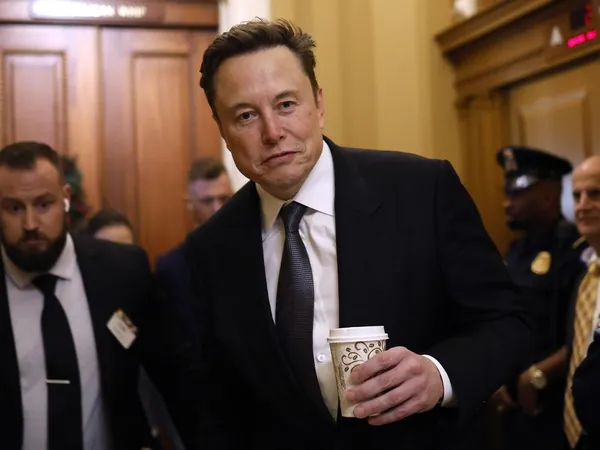
Elon Musk's Controversial Endorsement of Germany's Far-Right AfD: What It Means for the Upcoming Elections
2024-12-29
Author: Amelia
In a bold move, Elon Musk publicly reaffirmed his backing for the far-right Alternative for Germany (AfD) party, coinciding with an opinion piece released just weeks before pivotal elections in Germany. Musk, known for his global influence and extensive business interests—including a Tesla factory near Berlin—asserts that the AfD captures the sentiments of many Germans who feel alienated by mainstream political narratives.
In his comments to the newspaper Welt am Sonntag, Musk stated, “The AfD, despite its classification as far-right, embodies a political realism that resonates with a significant segment of the German population. It addresses pressing issues without the politically correct jargon that often dilutes the truth.” This declaration comes at a time when the AfD is under increased scrutiny, with several state chapters classified as extremist by German intelligence.
As tensions rise in German politics, Musk’s relationship with the country has not been without controversy. After openly criticizing Chancellor Olaf Scholz on social media, Musk has increasingly leaned into populist rhetoric, emphasizing the AfD's stance against immigration and its calls for a potential exit from the European Union. "The AfD advocates for a controlled immigration strategy that prioritizes the preservation of German culture and security," Musk elaborated, challenging the narrative that this stance is rooted in xenophobia.
The AfD's growing popularity has mirrored a broader shift in German political dynamics. Current polling shows that Musk's endorsement may energize the party, which has recently surged to nearly 20% support, making it the third-largest political force in the country. Meanwhile, the conservative bloc led by Friedrich Merz is at 31%, while Scholz's party lags behind with 17% support.
Critics, including prominent journalists and political leaders, have slammed Musk's involvement in German elections. Jan Philipp Burgard, the editor-in-chief of Welt, refuted Musk’s claims, arguing that the AfD’s extremist tendencies are well-documented and should not be dismissed. Likewise, Merz condemned Musk's influence as "intrusive and presumptuous," highlighting the unconventional nature of a foreign billionaire impacting another nation's electoral processes.
As the elections approach, Musk’s endorsement is set to spark intense discussions about nationalism, identity, and the influence of wealthy individuals in democracy. The political landscape in Germany is more volatile than ever, and how Musk’s comments will play out in voter behavior remains to be seen. As Germany readies for the polls, one thing is clear: Elon Musk's touch on German politics is anything but subtle.



 Brasil (PT)
Brasil (PT)
 Canada (EN)
Canada (EN)
 Chile (ES)
Chile (ES)
 Česko (CS)
Česko (CS)
 대한민국 (KO)
대한민국 (KO)
 España (ES)
España (ES)
 France (FR)
France (FR)
 Hong Kong (EN)
Hong Kong (EN)
 Italia (IT)
Italia (IT)
 日本 (JA)
日本 (JA)
 Magyarország (HU)
Magyarország (HU)
 Norge (NO)
Norge (NO)
 Polska (PL)
Polska (PL)
 Schweiz (DE)
Schweiz (DE)
 Singapore (EN)
Singapore (EN)
 Sverige (SV)
Sverige (SV)
 Suomi (FI)
Suomi (FI)
 Türkiye (TR)
Türkiye (TR)
 الإمارات العربية المتحدة (AR)
الإمارات العربية المتحدة (AR)